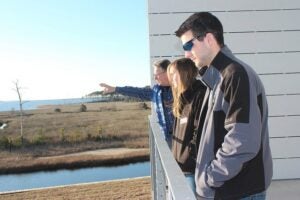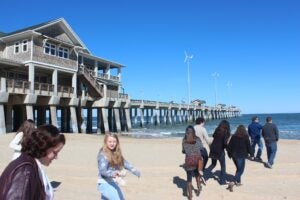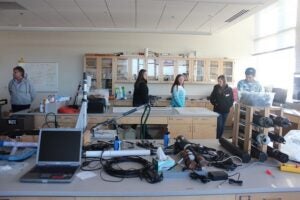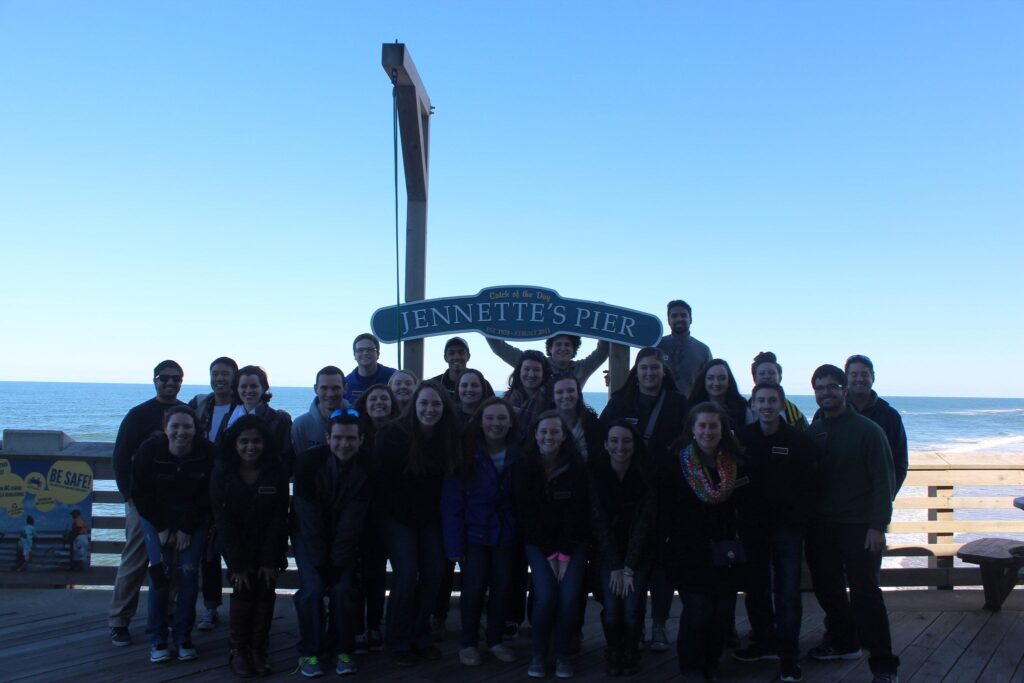April 8, 2016
ECU Honors College Forms Partnership with Coastal Studies Institute
By: Erika Dietrick, Undergraduate Director of Marketing and Communications
 Tourists from around the world travel from far and wide for a chance to spend time on the iconic beaches along Eastern North Carolina’s coast. Picturesque lighthouses, a rich maritime history, and unique flora and fauna are not only points of state pride — they are beacons of economic success, pillars of a an integral coastal environment, and a reminder of the cultural factors that have shaped the values of our region.
Tourists from around the world travel from far and wide for a chance to spend time on the iconic beaches along Eastern North Carolina’s coast. Picturesque lighthouses, a rich maritime history, and unique flora and fauna are not only points of state pride — they are beacons of economic success, pillars of a an integral coastal environment, and a reminder of the cultural factors that have shaped the values of our region.
However, high human traffic and the desirability of the sandy North Carolina coast also threaten the integrity of the very environment we so cherish.
 In comes the University of North Carolina Coastal Studies Institute (UNC-CSI).
In comes the University of North Carolina Coastal Studies Institute (UNC-CSI).
Now 13 years strong, the Coastal Studies Institute is based on Roanoke Island with the purpose of conducting environmentally relevant coastal research, engaging the public in important coastal issues, and inspiring interest in the next generation of environmental scientists. The inter-university institute draws prominent faculty from across the UNC system with East Carolina University faculty strongly represented. The strong partnership between the CSI and ECU has resulted in a number of coastally beneficially programs, including the Summester at the Coast and a Ph.D in Coastal Resources Management.
This collaboration has quickly extended to environmentally inclined ECU Honors College students who aim to make a positive difference on our coast through research or outreach.
 On a bright and windy day in February, ECU Honors College students paid a visit to Jennette’s Pier and the Coastal Studies Institute to learn more about the CSI’s mission and opportunities for student engagement. After a delicious lunch served by ECU alumnus Mike Kelly at his restaurant, Kelly’s Outer Banks Restaurant and Tavern, honors students were greeted by Dr. J.P. Walsh, Mike Muglia, and Mike Remige.
On a bright and windy day in February, ECU Honors College students paid a visit to Jennette’s Pier and the Coastal Studies Institute to learn more about the CSI’s mission and opportunities for student engagement. After a delicious lunch served by ECU alumnus Mike Kelly at his restaurant, Kelly’s Outer Banks Restaurant and Tavern, honors students were greeted by Dr. J.P. Walsh, Mike Muglia, and Mike Remige.
Well-dressed against the February chill, all three greeted our Honors College students eager to talk about renewable ocean energy.
“Many of the Outer Banks are showing continual erosion over time,” says Walsh. “This area has shown a long-term erosion rate on the order of a couple feet per year. As you go south from here, the erosion rate increases to about 10 feet per year…That’s one key problem that’s happening to this community.”
Alarmed by this research, the town of Nags Head spent $35 million of locally-funded revenue in 2011 to replace sediments along a 10-mile stretch of beach. The united community front to restore the shoreline illustrated the importance of these beaches and served as a wake up call for dedicated coastal research and conservation.
 Without the help of state tax dollars, the Coastal Studies Institute conducts research around five key areas: estuarine ecology and human health, coastal engineering and ocean energy, public policy and coastal sustainability, maritime heritage, and coastal processes. Between long hours of study, the CSI is proud to maintain its self-sufficiency by creating its own revenue, generating its own electricity, and obtaining materials for the facility from local sources. They are fully equipped to accomodate the testing of renewable ocean energy, such as a wave energy converter and magnetic mirroring for devices.
Without the help of state tax dollars, the Coastal Studies Institute conducts research around five key areas: estuarine ecology and human health, coastal engineering and ocean energy, public policy and coastal sustainability, maritime heritage, and coastal processes. Between long hours of study, the CSI is proud to maintain its self-sufficiency by creating its own revenue, generating its own electricity, and obtaining materials for the facility from local sources. They are fully equipped to accomodate the testing of renewable ocean energy, such as a wave energy converter and magnetic mirroring for devices.
 Honors College students also received a behind-the-scenes tour of the Institute led by David Sybert and Robert McClendon. Sybert and McClendon praised the enthusiasm and dedication of the CSI’s summer and semester interns and extended the opportunity for similar research experiences to our Honors College students.
Honors College students also received a behind-the-scenes tour of the Institute led by David Sybert and Robert McClendon. Sybert and McClendon praised the enthusiasm and dedication of the CSI’s summer and semester interns and extended the opportunity for similar research experiences to our Honors College students.
The day’s discussions about CSI’s role in coastal research and management piqued the interest of several honors students in attendance, including freshman Matthew Chilton.
“I came on this trip primarily because my family has always been around the beach,” says Chilton. “A lot of my family lives on the Outer Banks. I had no idea that this research was going on, or to this extent.”
Chilton confirmed the assertions of the CSI faculty that the coastal environment has created a unique culture.
“A lot of [this research] has to do with preservation. If we can preserve the environment here, we can preserve all of the culture here…because it’s not just environmental — there’s a whole anthropological side to this.”
He also echoed the murmurings of many of our students about a potential career in renewable ocean energy and coastal preservation.
“I think that the collaboration here provides a lot of opportunities for students. Now that I know that this exists, I’m giving some pretty intense thought about the direction I want to go with biology after graduation. I want to come back here.”
- Categories:
- Honors College

